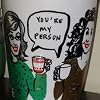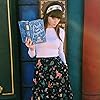To answer questions about
Three Women,
please sign up.
Cydney Cort
This is not about suffering and exploitation. It is more about passion and power. I think it goes for both men and women. We are all fools for love at some point. it is hard not to identify. The author makes no judgement which is what some people complain about but i think the stories are strong and speak for themselves. There is nothing creepy it is honest and compassionate.
Christine
If you read the entire book, you will see that none of these women wanted suffering and exploitation. All were actually looking for love and acceptance. It is not a misogynistic book at all.
Example: Maggie -- hardly "asking for it". Note that the teacher pursued HER in the Colorado texts, not vice versa. Add to that a 16 year old's lack of world experience, her naivete and dysfunctional family circumstances. It was up to the teacher to guide her (if he was such a great teacher). Instead he led her in a dangerous, life damaging (and obviously ego driven) Lolita game. The court, however, did portray Maggie as "asking for it".
Lina -- desperate for normal human affection.
Sloane -- seeking acceptance in the aftermath of her weirdly abnormal (although arguably "privileged") childhood.
Example: Maggie -- hardly "asking for it". Note that the teacher pursued HER in the Colorado texts, not vice versa. Add to that a 16 year old's lack of world experience, her naivete and dysfunctional family circumstances. It was up to the teacher to guide her (if he was such a great teacher). Instead he led her in a dangerous, life damaging (and obviously ego driven) Lolita game. The court, however, did portray Maggie as "asking for it".
Lina -- desperate for normal human affection.
Sloane -- seeking acceptance in the aftermath of her weirdly abnormal (although arguably "privileged") childhood.
Anna
I would say that this book is the very opposite of misogynistic. Maggie's story is a heart-wrenching account of first love at 16 and the criminal cruelty of someone who should have been there to support her, not exploit her feelings. What she went through in court had me close to tears.
Caroline Wang
This book wasn't written, by any means, to normalize female masochism, degrade women, or to promote any sort of inequality, but to provide raw insight on the complexities of desire and of being a woman. If anything, this book should be appreciated for its openness and honesty: these are real stories, told by real women. I wrote down this one quote that I read and I think it is responds perfectly to your questions: Women shouldn’t judge each one another’s lives, if we haven’t been through one another’s fires. (101)
Natalie Clark
I think it's a very honest telling of how many women and men have felt when they are in an abusive relationship where there is a power and or age imbalances. As a reader we know that the teacher is in the wrong however that doesn't mean we have to read this from Maggie's perspective have this explictly stated from the start. She loves him and enjoyed her experiences however the older she gets the more troubled she becomes as she realises the truth and severity of the situation. This man did not love her, he abused her. Only it has been Maggie who has been punished for wanting to sleep with older men rather than the older men being punished for exploiting a vulnerable child. If Maggie had have had relationships with people her own age as she was 16-18 then she could have consented and explored romantic and sexual feelings that are natural at her age. It is using the truth of how young women face a difficult predicament of being bombarded with sexual messages but not being able to explore sex in a healthy,pleasurable and empowering way. This has left her, along with her parents issues vulnerable to a man who should know better. You cannot criticises the book for highlighting the msygony and social control young women have over their own bodies but we should look to society, the media, education and to ourselves; how do we as women address this so other generation's do not suffer as Maggie has.
Em
No, quite the opposite. The author clearly shows how the power dynamic and the girl's vulnerability made her an innocent victim — certainly not the "asking for it" seductress the court tried to paint her as.
I don't think anyone in the situation was totally innocent (which seems beside the point anyway) but we are definitely made to sympathize with the girl, who was both led on and kept at arm's length by an adult she trusted and who had authority over her.
I don't think anyone in the situation was totally innocent (which seems beside the point anyway) but we are definitely made to sympathize with the girl, who was both led on and kept at arm's length by an adult she trusted and who had authority over her.
Caroline
Yes to everything you asked. Taddeo's portrayal of Maggie is concerning, and I felt compelled to address that in my review.
Charlene Schram
I am only 150 pages in and I don't believe that Maggie's story belongs here in this book. The story isn't told in her voice and parts of it read like The Twilight book that it occasionally references as her favourite book. Seventeen year old Maggie's point of view is going to be very different from forty year old Maggie's point of view. If the author wanted to tell the story of the desire and sexuality of a seventeen year old girl than she should have stuck to that angle and that voice. I am not sure I am going to make it through this book.
Jules
Fair questions. Like you've said here with these questions, many portrayals of women in the book point at them "asking for it" by being, in effect almost held to ransom by the desires of men. All females in the book experience desire but this is a dictated by men desire (men are in control - not the women) - men are in ownership of and control the power in the desire relationship. Yes, I guess this is 'extremely misogynistic'. Not one of the women in the book wins via feeling desire - the women are not empowered in this book.
Penny
The story is told from the victim's perspective entirely and not dressed up or 'romanticized' as you say. If you feel inclined to judge a rape victim's own version of her own story because it doesn't fit your narrative of what it should sound like then this book is not for you - but I hope you unlearn that and work on your empathy. It's comments like this that make it hard for abuse survivors to share their stories.
Sue Grillo
these are stories feel authentic. These things are a part of the narrative of being a young women; comfortable with the scenerio or not it's real life. nothing is normalized in or for the book. society normalizes it.
we live in a rape culture and these women represent real experiences.
what i appreciate about the stories is that each women is aware of their choices. As to the creepy element People are creepy; especially to women so there's that. and interestingly enough no woman desires suffering and exploitation yet we see in this read that rich or poor it comes with the territory
we live in a rape culture and these women represent real experiences.
what i appreciate about the stories is that each women is aware of their choices. As to the creepy element People are creepy; especially to women so there's that. and interestingly enough no woman desires suffering and exploitation yet we see in this read that rich or poor it comes with the territory
Mohammad Yazdani
please describe more.
About Goodreads Q&A
Ask and answer questions about books!
You can pose questions to the Goodreads community with Reader Q&A, or ask your favorite author a question with Ask the Author.
See Featured Authors Answering Questions
Learn more










